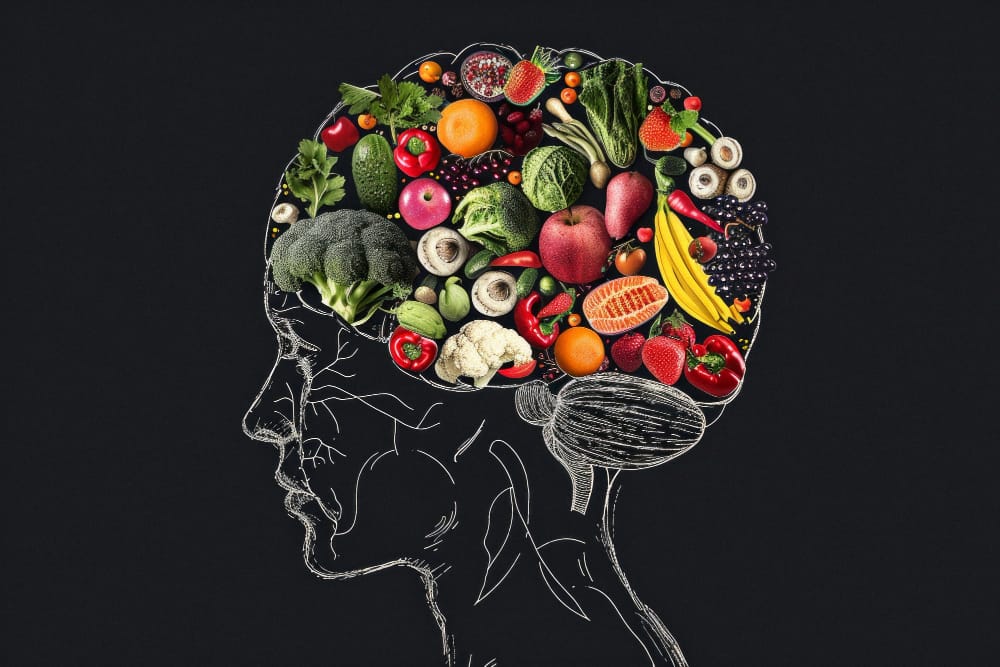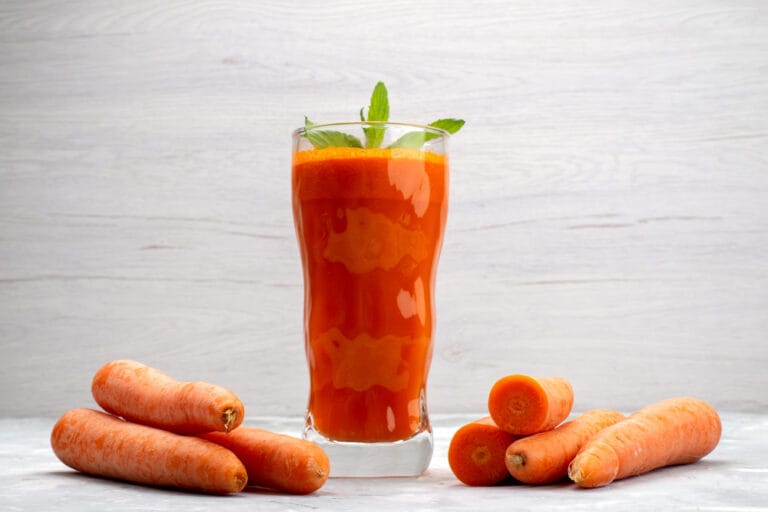FREE SHIPPING OVER $50
Eat These 8 Foods Daily for Better Focus, Memory, and Brain Health—Says a Dietitian

You know that feeling. You walk into a room and immediately forget why you went in there. Or you find yourself rereading the same paragraph three times, unable to focus. You might chalk it up to a long day, a lack of sleep, or just getting older. We’ve been led to believe that a foggy brain, a slipping memory, and a decline in focus are simply an inevitable part of life.
But what if they aren’t? The latest research from top nutrition experts, including registered dietitians, is proving that the food you put on your plate has a direct and powerful impact on the health of your brain. In fact, a simple adjustment to your daily diet can be one of the most effective ways to sharpen your mind, improve your memory, and protect your brain from long-term decline. We’re going to reveal the 8 foods that every dietitian wants you to eat for a sharper mind and a better life.
The Fuel for Your Brain: Why Food Matters
Your brain is the most complex and energy-demanding organ in your body. It uses about 20% of your body’s total energy, even though it makes up only 2% of your body weight. This incredible organ needs a constant, high-quality supply of fuel to function properly. When you feed it the right nutrition, you support everything from your ability to recall information to your long-term cognitive health.
Think of your brain like a finely tuned machine. Just as a high-performance car requires premium fuel, your brain requires premium nutrients. Without them, it can’t operate at its best, leading to issues like brain fog, poor focus, and problems with memory. The good news is that the best brain-boosting foods are not obscure or expensive—they are readily available, and a few simple additions to your daily diet can make all the difference.
8 Foods a Dietitian Wants You to Eat for a Sharper Mind
These brain foods are packed with specific nutrients that have been shown to support everything from cellular protection to improved blood flow. Here is a breakdown of the 8 foods that should be on your plate every day.
1. Fatty Fish (Salmon, Sardines, Mackerel)
Fatty fish are the undisputed champions of brain health. They are an incredible source of omega-3 fatty acids, specifically DHA and EPA.
- Why it works: Your brain is made of nearly 60% fat, and half of that fat is DHA. These omega-3 fatty acids are essential for building brain and nerve cells. They also reduce inflammation, which is a major contributor to brain aging and cognitive decline. Studies have shown that people who eat more fatty fish have better memory and improved cognitive performance.
- How to eat it: Aim to eat a serving of fatty fish twice a week. You can have salmon for dinner, sardines on crackers for lunch, or add smoked mackerel to a salad.
2. Berries (Blueberries, Strawberries, Blackberries)
These small fruits are packed with powerful plant compounds called flavonoids, which are a type of antioxidant.
- Why it works: Your brain is highly susceptible to oxidative stress, which can damage brain cells and accelerate aging. The antioxidants in berries help to protect your brain from this damage. Research suggests that the flavonoids in berries can improve communication between brain cells, reduce inflammation, and enhance memory and learning.
- How to eat it: Berries are easy to add to your daily diet. Put them in a smoothie, sprinkle them on top of yogurt or oatmeal, or simply eat a handful as a snack.
3. Leafy Green Vegetables (Kale, Spinach, Collards)
Your mom was right—you should eat your greens. Leafy green vegetables are rich in brain-healthy nutrients like Vitamin K, lutein, folate, and beta-carotene.
- Why it works: These nutrients have been shown to slow cognitive decline. In fact, one study found that eating just one serving of leafy greens a day could slow cognitive aging by over a decade. Vitamin K helps with fat synthesis in brain cells, and folate is crucial for proper brain function.
- How to eat it: Add a handful of spinach to your morning smoothie, make a large salad with kale for lunch, or sauté some collard greens as a side dish for dinner.
4. Walnuts
All nuts are good for your brain, but walnuts are particularly special. They are an excellent source of alpha-linolenic acid (ALA), a type of omega-3 fatty acid, as well as antioxidants and Vitamin E.
- Why it works: Walnuts’ combination of healthy fats and antioxidants helps to reduce oxidative stress and inflammation. The Vitamin E in walnuts also helps to protect brain cells from damage. Studies have linked walnut consumption to better cognitive performance and a reduced risk of Alzheimer’s disease.
- How to eat it: Keep a small bag of walnuts in your desk or car for a quick snack. Add them to your morning oatmeal or sprinkle them over a salad for a satisfying crunch.
5. Dark Chocolate
Yes, you read that right. Dark chocolate, specifically with 70% cocoa or more, is a fantastic brain food.
- Why it works: Dark chocolate is packed with flavonoids, which have antioxidant and anti-inflammatory properties. The flavonoids in cocoa are thought to improve blood flow to the brain, which in turn enhances focus and memory. It also contains a small amount of caffeine and other stimulants that can boost alertness.
- How to eat it: Choose a high-quality dark chocolate with at least 70% cocoa. Enjoy a small square or two as a daily treat.
6. Avocados
Avocados are a fantastic source of monounsaturated fats, which are essential for brain health.
- Why it works: The healthy fats in avocados help to support healthy blood flow to the brain. Proper blood flow is critical for delivering oxygen and nutrients to brain cells. When your brain has a steady supply of what it needs, your focus and memory improve.
- How to eat it: Add a few slices of avocado to your morning toast or sandwich, mash it into guacamole, or add it to a salad.
7. Eggs
Eggs are a nutrient-dense powerhouse that offers a range of benefits for your brain. They are a great source of choline and B vitamins like B6, B12, and folate.
- Why it works: Choline is a key nutrient your body uses to produce acetylcholine, a neurotransmitter that is crucial for memory and mood. The B vitamins in eggs help to lower levels of homocysteine, an amino acid that can lead to cognitive decline if levels are too high.
- How to eat it: Eggs are incredibly versatile. You can have them scrambled, poached, or boiled for a quick and easy breakfast or snack.
8. Turmeric
This bright yellow spice, commonly used in curries, contains an active ingredient called curcumin.
- Why it works: Curcumin is a potent anti-inflammatory and antioxidant compound that can cross the blood-brain barrier. It has been shown to improve memory in people with Alzheimer’s disease and can help to protect the brain from damage.
- How to eat it: Add a pinch of turmeric to your scrambled eggs, a curry, or a smoothie. You can also make a calming “golden milk” by mixing it with warm milk and a dash of black pepper, which helps your body absorb the curcumin.
Beyond the Plate: The Lifestyle Connection
While these 8 brain foods are a powerful tool, it’s also important to remember that nutrition is just one part of a holistic approach to brain health.
- The Blood Sugar Link: Your brain is dependent on glucose for energy. However, large spikes and crashes in blood sugar can impair your cognitive function. Eating a balanced diet that includes fiber-rich foods like whole grains, beans, and vegetables can help to regulate blood sugar and provide a steady supply of energy to your brain. This helps to prevent that afternoon brain fog.
- The MIND Diet: Many dietitians recommend a diet called the MIND Diet, which stands for Mediterranean-DASH Intervention for Neurodegenerative Delay. This nutrition plan combines the best parts of the Mediterranean and DASH diets and is specifically designed to support brain health. It emphasizes many of the foods we’ve discussed, including berries, leafy greens, nuts, and fish.
Making It a Habit: Simple Swaps for a Smarter Diet
You don’t have to overhaul your entire diet overnight. Start with one or two small changes and build from there.
- Morning: Add a handful of leafy greens and berries to your morning smoothie or oatmeal.
- Lunch: Swap your typical sandwich for a salad with walnuts and a vinaigrette dressing.
- Dinner: Incorporate fatty fish into your meals at least twice a week.
- Snacks: Swap processed snacks for a handful of walnuts or a piece of dark chocolate.
Conclusion
You have the power to protect and improve your brain’s health with every meal you eat. By being intentional about your nutrition and adding these 8 brain foods to your daily diet, you can fight back against brain fog, sharpen your focus, and protect your memory. It’s not about finding a magic pill; it’s about giving your brain the consistent, high-quality fuel it needs to thrive. Take a step toward a sharper mind today by simply choosing one of these foods and adding it to your plate.
Related Articles
- These 3 Popular Diets Are Crushing Diabetes—Doctors Are Taking Notice
- 10 Powerful Plant Proteins That Can Replace Meat—Plus 3 Nutrients You Might Be Missing
- Want Glowing Skin and Stronger Immunity? These 10 Foods Supercharge Your Glutathione Naturally
- This Overlooked Fruit Could Be the Key to Balanced Blood Sugar—Longevity Experts Are Talking
- Feeling Off? These 10 Foods Could Be Messing With Your Estrogen







